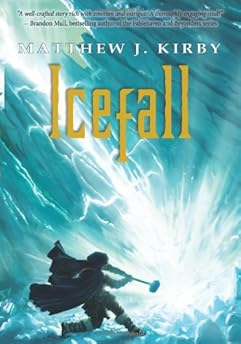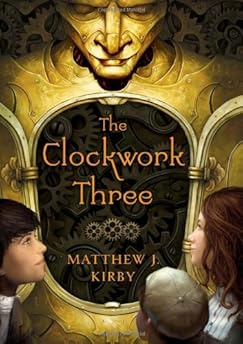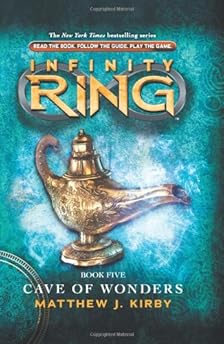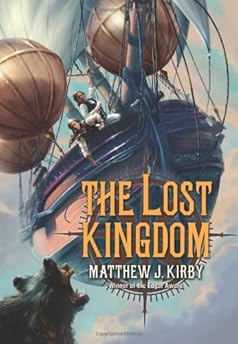 Matthew Kirby is a highly acclaimed author of several Middle Grade /Young Adult novels, including Icefall (which won an Edgar Award) and The Clockwork Three. A former school psychologist, Kirby now lives in Idaho, where he is currently at work on several upcoming novels. He graciously gave up some time to talk to me about his most recent novel, The Lost Kingdom, and what he has planned for the future.
Matthew Kirby is a highly acclaimed author of several Middle Grade /Young Adult novels, including Icefall (which won an Edgar Award) and The Clockwork Three. A former school psychologist, Kirby now lives in Idaho, where he is currently at work on several upcoming novels. He graciously gave up some time to talk to me about his most recent novel, The Lost Kingdom, and what he has planned for the future.
Bill Capossere: It seems to me that The Lost Kingdom skews younger than your prior two books, in the sense that while all three can be enjoyed by Middle Grade or Young Adult audiences, the other two, especially Icefall, can lay claim as well to older audiences due to a more mature sense of richness and complexity. The structure of The Lost Kingdom, for instance, is pretty linear and straightforward, while the other two had intertwined/interrupted narratives with narrative and temporal shifts. The language as well seems pared down, less lyrical or poetic than say Icefall. While I think I can make some very good arguments as to why these decisions make sense, I’d rather hear whether you agree with that observation and ask if you can speak to it at all. For example, had you planned on writing this for a younger audience, did the book take this form all along or was it modified, did you make a purposeful shift away from that poetic language of Icefall, etc.
Matthew Kirby: Whenever I start a book, I usually have a pretty clear sense of the language in which that story wants to be told. With The Clockwork Three, I wanted language that was ornate and gilded, almost baroque, with more intricate prose. With Icefall, I wanted crystalline language that felt as if it had been chiseled from the ice. With The Lost Kingdom, I wanted lean prose, more muscular language that did the job required of it and not much more. That seemed to fit this book about a boy on the cusp of becoming a man. I also intended this to be a bit of an homage to Verne, whom I discovered and read at about Billy’s age, which called for a very linear structure.
What led to your choosing this time period to set your novel in? What about the time and these historical figures attracted you or made you think it fertile ground for a novel?
Well, I initially thought I might write a novel about a father and son on a journey to the kingdom of Prester John. I mean, you had the pope supposedly engaging in correspondence with this legendary king, so I thought it might be cool to tell the story of the mailman sent to deliver the letter. But somewhere along the way of researching that, I started to wonder if America had its own Prester John. It didn’t take long to find Madoc, and suddenly a whole new book emerged, one I was much more interested in writing. The idea of an American fantasy appealed to me in a huge way.
What sort of research did you do and how closely did you hew to historical fact? Was there any little tidbit you discovered that you loved learning, whether it made it into the book or not?
I knew from the beginning that this would be an unambiguous fantasy. I planned to take Colonial American beliefs at face value, including Madoc and the continued existence of prehistoric megafauna, so I knew I would be breaking from the historical record all over the place. That said, I wanted the book grounded in some basic facts. I think that lent it a certain verisimilitude. In the author’s note, I try to unpack a bit of what I took from the record and what I made up. Something I learned that couldn’t make it into the book, but which fascinated me, was that a population of wooly mammoths actually persisted on a remote Arctic island until 2700 B.C.E. That just blew my mind.
 One of the running plot points involves the group being stalked through much of the novel by a dangerous creature. If it’s possible to discuss without spoilers, can you talk about how you viewed this plot element working in the novel?
One of the running plot points involves the group being stalked through much of the novel by a dangerous creature. If it’s possible to discuss without spoilers, can you talk about how you viewed this plot element working in the novel?
For Billy to go out into the wilderness on this expedition, I wanted a wilderness that could bite back. I didn’t want a pastoral, overly romantic take on the frontier. I wanted Billy to find a place with claws, and rather than having him encounter a series of separate dangers, I chose to embody the peril and unstoppable power of nature in a single, terrifying beast. After writing the book, I realized there could be additional layers of metaphor there, but I didn’t think about those things as I wrote it.
There seems an interesting theme of self-awareness (or perhaps self-blindness is more accurate) in The Lost Kingdom: characters who talk a lot about “freedom” own slaves, characters who abhor slavery are harshly racist when it comes to Native Americans, scientists are blinded by the possible impact of their obsessions. Was this something you purposely threaded through and if so, can you speak to what you were trying to do?
I think it was something I did deliberately. To begin with, I usually avoid writing characters who are all one thing or another. I find villains who are all bad and heroes who are all good to be uninteresting and unrealistic. I think our internal and external inconsistencies are aspects of our identities that make us human beings, so I try to give my characters competing or dissonant qualities. But when writing for readers of this age group, it’s important to remember that developmentally they’re stepping out of the black and white world into one that’s a lot more gray. They’re ready to start tackling some of the messiness in the world, where answers aren’t so simple. They’re gaining self-awareness, and awareness of those around them. They’re beginning to form their identities. I think that finds its way into my writing for this age.
In a lot of fiction for younger readers, adults are removed wholly from the scene, sometimes literally, sometimes figuratively (young characters are orphans or runaways, parents are oblivious, etc.) or adults are the obstacles. In your novels, however, adults play key, often positive roles, especially as mentors. They teach the young characters, sometimes directly, sometimes simply by their presence, both how to be and, sometimes more importantly, how not to be. How do you feel about the role of adults in YA/MG fiction in general and then in your own work?
I’m always a bit uncomfortable with completely absent parents or adults in middle grade fiction. I know that’s a popular fantasy with kids, one I had all the time growing up. But it’s unrealistic to me, and I have a hard time completely suspending my disbelief at that, even to write it. In my own life, adults have been there in very positive ways teaching and guiding me at crucial junctures, and I feel very fortunate to say that. In my own fiction, adults are present in many different kinds of roles, but I always try to make sure they’re human and nuanced, too.
 Do you see a difference in YA vs. MG and does any of that work into your writing/revising process at any point? Do you have any input into the marketing of your books in terms of age? Do you have any plans for more adult work (or did you start with adult work) or would you say you have “found your happiness” so to speak?
Do you see a difference in YA vs. MG and does any of that work into your writing/revising process at any point? Do you have any input into the marketing of your books in terms of age? Do you have any plans for more adult work (or did you start with adult work) or would you say you have “found your happiness” so to speak?
There is a difference between middle grade and YA fiction. There’s actually a lot of difference just between lower and upper middle grade (it encompasses ages 8 to 12, which is kind of ridiculous when you consider the development taking place during those four years). But I try not to think about the marketing, and I really try not to think about age as I’m writing. I just try to tell the story as purely as I can, and give it what it needs. If a story needed mature content to be told, in terms of language, sex, or violence, I would include it, and it would no longer be considered a children’s novel. I don’t have plans to write intentionally for adults, but I do have a pretty grisly horror book itching to get out that will likely be marketed as YA. But I leave those decisions to the publisher.
I’ve mentioned the complexity, both structurally and stylistically, of your earlier novels. Was there ever any concern on your part that such complexity might be a hindrance for YA readers?
With respect to any concerns about complexity, no, I don’t worry about that at all. I think it’s fatal to a story to write it “down” in any way for a younger audience. If anything, I try to push against what I think a young reader is capable of and go beyond it. I try to write up to them. My work as a school psychologist for 7 years showed me that young readers are capable of much more than people often assume. I go where the story needs to go, stylistically and structurally, and I find that if I trust in my readers, most of the time they will meet the story where it is.
In that same vein, considering the structural complexities, I’m curious as to the writing process itself, how you work your way through the novels — do you write the entire work straight through, or do you attack various sections simultaneously, or run through a whole storyline then start another? Some mishmash of those?
I’m an extremely linear writer. I can’t write scenes out of order, generally speaking. I experience the book one page at a time, the same way the reader does, without any outlining beyond a sense of the crisis I’m ultimately building the tension toward. The exception to that has been Icefall. In the first draft, the flashbacks weren’t in the book. But my editor really wanted more back-story for the characters, where they’d come from. I felt very strongly that I didn’t want the characters to leave the fjord in a physical way. I felt it was important for them to be trapped there from page one to maintain the claustrophobia the story needed. I developed the flashbacks as a solution to this, providing history and context to the characters, while keeping the narrative firmly imprisoned in that setting.
 You are one of the authors writing the INFINITY RING series. Can you talk about how you got involved in that and what the process is like? Do you enjoy that sort of collaborative effort? Do you see yourself doing more? What are your feelings on the integration of games into books/series?
You are one of the authors writing the INFINITY RING series. Can you talk about how you got involved in that and what the process is like? Do you enjoy that sort of collaborative effort? Do you see yourself doing more? What are your feelings on the integration of games into books/series?
The invitation to contribute to that came in a pretty straight forward way. I got an email one day, had to sign a cloak and dagger non-disclosure agreement, and then talked with the editors about the project. Right away, I knew it was up my alley, and I was given complete freedom within the premise of the story to take the characters to a point in time that interested me. Collaborating with the other authors in the series has been a great experience. We met once all together in NYC, and that was really cool. I imagine it was something like what the work in a writers’ room on a TV show must be. Everyone throwing ideas out, talking about them, using them to leap to new ideas. We had several conference calls as well, and I really enjoyed the whole process. I would certainly be open to doing it again, if my schedule allows. As for the RPG games, the INFINITY RING series offers readers a chance to take ownership of the story in a totally unique way. They can go online and play as the characters in the books, solving historical problems of their own, all while learning. The books actually reference events in the games, and vice versa. It’s a complete multimedia experience, and if it had been around while I was growing up, I’d have been all over it. If done right, and I think INFINITY RING is done right, the integration of games and books presents some really exciting narrative possibilities.
What other projects do you have waiting in the wings? What do we have to look forward to?
I’m working on a magical crime saga right now called THE QUANTUM LEAGUE. It will be a trilogy, and I wanted to try something new, from a stylistic and structural standpoint. The first book, Spell Robbers, will be a fast-paced, twisty-turny heist novel, with prose that doesn’t draw any attention to itself at all, hopefully. The second novel will be a mafia novel, and the third will be a cat-and-mouse chase after the criminal mastermind. The first book comes out in January from Scholastic. I’m also working on a trilogy for HarperCollins, a near-future science fiction story where a new ice age has encased the earth, and an ancient alien presence is finally making itself known. That will start up next fall.
What authors, if any, have you read lately? Any recommendations? What authors would you call inspirations, if any?
For inspiration, A Wizard of Earthsea is the book that made me want to be a writer. Without exception, I read everything Ursula K. Le Guin writes. Writers I have come to really admire as an adult include M.T. Anderson, Neil Gaiman, Kelly Link, Ted Chiang, Michael Chabon, Philip Pullman. They and so many others are all must-reads for me anytime they have something new.
Finally, a question I always like to ask at the end is if you can recall for us one or two of those magical moments of response to a particular scene in a book or two — those sort of “shiver moments” that make one fall in love with the magic of reading all over again or that we carry with us for years afterward.
In A Wizard of Earthsea, the moment where Ged opens the rift, and that “clot” of shadow leaps out at him still gives me chills. As a twelve year old, that sentence and that one word stopped me in my tracks. I read it over and over and over. That was actually the exact moment I became aware of the power of the storyteller and the story, and I knew I wanted to be a writer.
Thanks so much for your time!




I have Icefall sitting in my Audible library. I’m really looking forward to reading it!
Interesting about Le Guin. I admire her, too. I love how she makes every word count. I remember that shadow scene very well!
I LOVED Icefall and can’t wait to read the others. I didn’t know about them. The Quantum League sounds awesome!
Its not my first time to pay a quick visit this website, i am browsing this web
site dailly and get good information from here all the time.